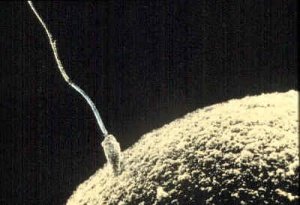(Redirected from
Egg cell)
An ovum (also oocyte, ovocyte, or loosely, egg or egg cell) is a female sex cell or gamete. Both animals and seed plants have ova. The term ovule is used for the ovum of seed plants and for the young ovum of an animal. The word is derived from the Latin word ovum (plural ova) for egg.
In higher animals, ova are produced by organs called ovaries. In the oviparous animals (all birds, most fishes, amphibians and reptiles) the ova develop protective layers and pass through the oviduct to the outside of the body. They are fertilized by male sperm either inside the female body (as in birds), or outside (as in many fishes). After fertilization, an embryo develops, nourished by nutrients contained in the egg. It then hatches from the egg, outside the mother's body. See egg (biology) for a discussion of eggs of oviparous animals.

A sperm attempting to fertilize an ovum
In the viviparous animals (which include humans and all other placental mammals), the ovum is fertilized inside the female body, and the embryo then develops inside the uterus until it is born. It receives nutrition directly from the mother. The ovum is the largest cell in the human body, typically visible to the naked eye without the aid of a microscope or other magnification device.
There is an intermediate form, the ovoviviparous animals: the embryo develops within and is nourished by an egg as in the oviparous case, but then it hatches inside the mother's body shortly before birth, or just after the egg leaves the mother's body. Some fish, reptiles and many invertebrates use this technique.
See also
External links
Last updated: 08-14-2005 15:21:26